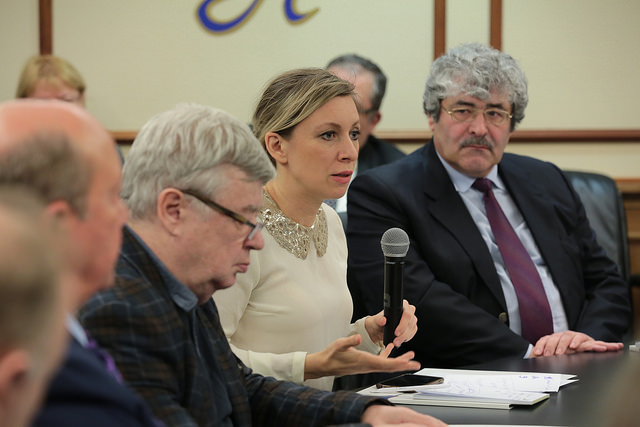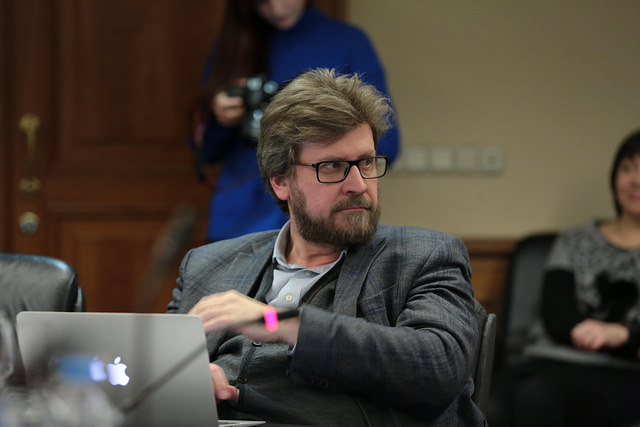A recent OSCE report , “Propaganda and Freedom of the Media,” raises the question of whether there has been an erosion of journalism integrity both in Russia and the West. Implicitly, it highlights how the perception of what makes for good reporting has been changing since the start of the Ukrainian crisis and the Russia-West confrontation in 2013-2014. The question of whether or not journalists should take sides during a conflict becomes increasingly relevant among both Russian and Westerns media experts.
A recent report of the Organization for Security and Cooperation in Europe (OSCE), “Propaganda and Freedom of the Media,” raises the question of whether there has been an erosion of journalism integrity both in Russia and the West. Implicitly, it highlights how the perception of what makes for good reporting has been changing since the start of the Ukrainian crisis and the Russia-West confrontation in 2013-2014.
Given that the West and Russia repeatedly point fingers at each other and accuse each other of using media for propaganda purposes, the OSCE report is very relevant. As a result, the report generated its fair share of publicity in some Russian media in February.
In today’s highly charged geopolitical environment, “propaganda” has become a sort of a buzzword among academics, experts and media professionals. On Feb. 24, experts, officials and journalists discussed this problem once again at the Russian International Affairs Council (RIAC), a well-known Russian think tank. One of the speakers, Maria Zakharova, the official spokeswoman for Russia’s Foreign Ministry, pointed to the lack of trust between journalists themselves.
According to Zakharova, any attempt to undermine the trust between reporters by dividing them into “right” and “wrong” is dangerous, because it hampers cooperation and nurtures confrontation. At the same time, she believes that journalists should not stay away from a face-off – they should be in the thick of it, providing two points of view.
In general, such a view resonates with other Russian and Western journalists, who believe that a reporter should take a certain position while covering international events, especially during times of geopolitical confrontation. As indicated by numerous expert discussions both in Russia and the U.S., one is witnessing just a sort of confrontation now, the so-called “information war.”
The question of whether or not journalists should take sides during a conflict came up last year at the convention of the Association of Slavic, Eastern European and Eurasian Studies (ASEEES), which brought together a number of experts, including Michael Weiss, a well-known U.S. journalist covering international affairs, and Pavel Khodorkovsky, the director of the Institute of Modern Russia.
They argue that, during periods of the active development of civil journalism, it is increasingly difficult to remain detached and unbiased, implying that international events themselves force reporters to take sides. Likewise, such interpretation of the role of media is also common for the policy of Russia’s state-controlled TV channel, RT, which is seen by many experts as a tool of the Kremlin’s propaganda.
The editor-in-chief of RT, Margarita Simonyan, repeatedly said that there is no such thing as objectivity in a number of interviews and during RT’s 10th anniversary celebration, which took place in 2015. To follow such logic, it is impossible to remain unbiased, given that journalists are humans with their own views, perceptions and emotions; so, good reporting is a matter of interpretation of the events.
However, such a view of journalism affects its very nature. It hardly can be a sort of indulgence for avoiding well-balanced, responsible reporting. In practice, it leads to a situation, where Western experts are talking about the cynicism, the danger and the aggressiveness of the Kremlin’s propaganda, while their Russian counterparts seem to be obsessed with what they call counterbalancing “the Western hegemony” in the media landscape, as indicated by discussions at the 2015 ASEEES Convention and the conference dedicated to RT’s 10th anniversary.
Moscow-based political analyst Mikhail Troitskiy argues that any media buzz about counter-propaganda “tries to justify their own propaganda or bias” as well as get additional funding for their projects. It implies that the very concept of “information war” is a sort of virtual myth, frequently used to avoid well-balanced and responsible reporting. For some, who prefer not to be unbiased, information wars exist, while those who stick to well-balanced coverage do not accept the framework of information wars.
However, Dmitry Trenin, Carnegie Moscow Center’s director argues that, “The information space is a battlefield and this will continue to be a battlefield.”
“Since it is a major field, there are the differences between the Cold War and now. During the Cold War, there were two different informational spaces: One was within the Soviet Union and its satellite states and the other one was in the Western world and non-Communist world. Today we — Russia and the West — live in a single information space, which makes the task of propaganda more difficult,” he told Russia Direct in an interview.
At the same time, Trenin argues propaganda does “necessarily kill objectivity everywhere.“ After all, it is a free choice to participate in information wars or to be professional and objective “and try to see things from the vantage point of professionalism, not professionalism in information warfare, but professionalism in the study of international relations or other relevant policy subjects.”
Fyodor Lukyanov, the head of Russia’s Council on Foreign and Defense Policy and editor-in-chief of Russia in Global Affairs magazine, called for sticking to unbiased reporting during this week's RIAC discussion. According to him, journalists should not take any sides of a conflict or a confrontation. Instead, they “should take the position of a professional [and independent] observer, who is able to detach oneself from emotions” and subjective assessments, because it is not the interpretation that matters in reporting, but the attempt to seek truth.
With no agreements on journalistic integrity, the OSCE report on propaganda should be a warning signal and a reminder that sometimes propaganda, even though it can be a free choice of everybody, might lead, inadvertently or not, to grave implications for society and a nation in general. If it spurs hatred, violence or hostility, be it anti-Americanism or Russophobia, if it fuels fears about a future possible war, if it oversimplifies and it dangerously manipulates the facts, if it misleads and spreads defamation, it might create new problems and challenges.
First published in Russia Direct






